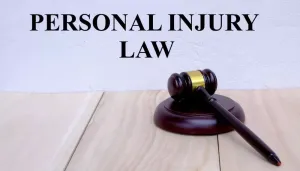5 Mistakes That Can Wreck Your Motorcycle Injury Claim
- account_circle admin
- calendar_month Sen, 1 Sep 2025
- visibility 166
- comment 0 komentar

5 Mistakes That Can Wreck Your Motorcycle Injury Claim
5 Critical Mistakes That Can Wreck Your Motorcycle Injury Claim
KlikBabel.com – 5 Mistakes That Can Wreck Your Motorcycle Injury Claim. The roar of an engine, the open road, the unparalleled sense of freedom – these are the joys of motorcycling. But alongside the exhilaration comes an undeniable vulnerability. When a motorcycle accident occurs, the consequences are often severe, leading to catastrophic injuries, extensive medical bills, and significant lost wages. While the physical and emotional recovery is paramount, navigating the complex world of personal injury claims can be equally daunting.
Many injured riders, through no fault of their own, inadvertently make critical mistakes that can severely jeopardize their chances of securing the fair compensation they deserve. Insurance companies, whose primary goal is to minimize payouts, are quick to exploit these missteps. Understanding and avoiding these common pitfalls is crucial to protecting your rights and securing your future.

5 Mistakes That Can Wreck Your Motorcycle Injury Claim
Here are five critical mistakes that can wreck your motorcycle injury claim:
Mistake #1: Delaying or Skipping Medical Attention
In the chaotic aftermath of a motorcycle accident, adrenaline can mask pain, leading some riders to believe their injuries are minor or non-existent. Others might delay seeking medical care due to fear of costs or a desire to “tough it out.” This is a grave error.
Why it Wrecks Your Claim:
- Weakens Causation: A significant gap between the accident and your first medical visit creates doubt about whether your injuries were truly caused by the collision. Insurance adjusters will argue that something else could have caused your pain.
- Diminished Credibility: Delays can make it appear as though your injuries aren’t severe, undermining the legitimacy of your claim for pain and suffering.
- Incomplete Documentation: Medical records are the backbone of any personal injury claim. Without prompt and consistent documentation from healthcare professionals, it’s difficult to prove the extent and nature of your injuries.
What to Do Instead:
Seek immediate medical attention, even if you feel fine. Go to the emergency room, an urgent care clinic, or your primary physician. Follow all recommended treatments, attend all appointments, and keep meticulous records of every visit, diagnosis, and prescription.
Mistake #2: Talking to Insurance Companies Without Legal Counsel
Shortly after an accident, you’ll likely receive calls from the at-fault driver’s insurance company. They may sound friendly and helpful, but remember: their allegiance is to their policyholder and their bottom line, not to your recovery.
Why it Wrecks Your Claim:
- recorded statements: They will often ask for a recorded statement. During this, they’re looking for inconsistencies, admissions of fault, or anything they can use to devalue or deny your claim. They are experts at asking leading questions designed to elicit damaging responses.
- Premature Settlements: They might offer a quick, lowball settlement before the full extent of your injuries and long-term costs are known. Accepting this offer waives your right to seek further compensation, even if your condition worsens.
- Misinterpretations: Anything you say can be twisted or taken out of context to suggest you were at fault or that your injuries aren’t as severe as claimed.
What to Do Instead:
Politely decline to give any recorded statements or discuss the details of the accident with the other driver’s insurance company. Simply provide your name and contact information, and inform them that all further communication should go through your attorney. An experienced motorcycle accident lawyer will handle all communications, protecting you from manipulative tactics.
Mistake #3: Admitting Fault or Apologizing at the Scene
In the moments following an accident, emotions run high. It’s natural to feel shaken, confused, and perhaps even apologetic out of sheer instinct or politeness. However, any statement that could be construed as an admission of fault can be devastating to your claim.
Why it Wrecks Your Claim:
- Used Against You: Even a simple “I’m so sorry!” or “I didn’t see you” can be used by the other party’s insurance company as evidence that you were fully or partially responsible for the accident.
- Legal Implications: Depending on your state’s comparative negligence laws, being found even partially at fault can significantly reduce the amount of compensation you can receive, or even bar you from recovery entirely.
What to Do Instead:
Stick to the facts. Exchange contact and insurance information, report the accident to the police, and seek medical attention. Do not speculate about who was at fault, do not apologize, and do not make any statements beyond what is absolutely necessary for safety and official reporting.
Mistake #4: Neglecting Documentation and Evidence Collection
The success of your claim hinges on solid evidence. Many victims underestimate the importance of meticulous documentation from the moment the accident occurs.
Why it Wrecks Your Claim:
- Lack of Proof: Without concrete evidence, your claim becomes a “he said, she said” scenario, which insurance companies love because it allows them to deny liability.
- Undervalued Damages: You might forget crucial details about your pain, suffering, or lost opportunities if you don’t document them regularly. This can lead to an undervaluation of your damages.
- Missed Opportunities: Key evidence, like skid marks or witness contact info, can disappear quickly if not collected immediately.
What to Do Instead:
- At the Scene: Take photos and videos of the accident scene from multiple angles, including vehicle damage, road conditions, skid marks, traffic signs, and any visible injuries. Get contact information from witnesses.
- Police Report: Obtain a copy of the official police report.
- Medical Records: Keep all medical records, bills, and receipts related to your injuries.
- Journal Your Recovery: Maintain a detailed journal documenting your pain levels, limitations, emotional distress, and how your injuries impact your daily life.
- Lost Wages: Keep records of any lost income, including pay stubs, tax returns, and employer statements.
Mistake #5: Posting on Social Media
In today’s digital age, sharing aspects of our lives online is second nature. However, during an active injury claim, your social media activity can become a weapon in the hands of insurance adjusters and defense attorneys.
Why it Wrecks Your Claim:
- Misinterpretations: A smiling photo at a family gathering or a post about a minor outing can be twisted to suggest you’re not as injured as you claim, even if you’re in immense pain.
- Inconsistent Statements: Any posts discussing your accident, injuries, or daily activities can be compared to your official statements and medical records, creating perceived inconsistencies.
- Loss of Privacy: Once something is online, it’s essentially public. Insurance companies regularly scour social media profiles for information that can undermine claims.
What to Do Instead:
Go dark on social media or set all your profiles to private immediately after an accident. Refrain from posting about your accident, injuries, recovery, or even general daily activities. Ask friends and family not to tag you in photos or post about your situation. Assume anything you post could be seen by the insurance company.
The Crucial Solution: Hiring an Experienced Motorcycle Accident Attorney
The most effective way to avoid these critical mistakes and protect your motorcycle injury claim is to retain an experienced personal injury attorney specializing in motorcycle accidents as soon as possible after your crash.
A dedicated attorney will:
- Handle all communications with insurance companies.
- Investigate the accident thoroughly, gathering crucial evidence.
- Ensure you receive proper medical care and documentation.
- Accurately assess the full value of your claim, including current and future medical expenses, lost wages, pain and suffering, and other damages.
- Negotiate aggressively on your behalf or take your case to court if a fair settlement cannot be reached.
Don’t let these common missteps derail your path to recovery and justice. By being aware and proactive, especially by enlisting professional legal help, you can significantly strengthen your motorcycle injury claim and secure the compensation you rightfully deserve.
FAQ: Motorcycle Injury Claims
Q1: How long do I have to file a motorcycle injury claim?
A1: The time limit for filing a personal injury lawsuit, known as the “statute of limitations,” varies significantly by state. In most states, it ranges from one to three years from the date of the accident. However, there can be exceptions, and it’s always best to consult with an attorney immediately to ensure you don’t miss any critical deadlines.
Q2: What if I was partially at fault for the motorcycle accident? Can I still get compensation?
A2: It depends on your state’s specific “comparative negligence” laws. Most states follow either a “modified comparative negligence” rule (you can recover if you are less than 50% or 51% at fault, but your compensation is reduced by your percentage of fault) or a “pure comparative negligence” rule (you can recover even if you are mostly at fault, but your award is reduced proportionally). A few states still use “contributory negligence,” which bars recovery if you are even 1% at fault. An attorney can explain how these laws apply to your specific situation.
Q3: What kind of compensation can I receive in a motorcycle injury claim?
A3: Compensation (known as “damages”) in a motorcycle injury claim typically falls into two categories:
- Economic Damages: These are quantifiable financial losses, including medical expenses (past and future), lost wages (past and future), property damage, rehabilitation costs, and out-of-pocket expenses.
- Non-Economic Damages: These are more subjective losses that don’t have a direct monetary value, such as pain and suffering, emotional distress, loss of enjoyment of life, disfigurement, and loss of consortium (for spouses). In rare cases involving extreme negligence, punitive damages may also be awarded to punish the at-fault party.
- Penulis: admin












Saat ini belum ada komentar